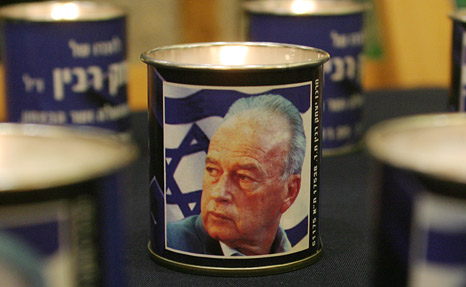Israeli Democracy Day: Yitzhak Rabin's Legacy for the Future
On the 19th anniversary of the assassination of Yitzhak Rabin, an event that targeted Israeli democracy itself, Prof. Yedidia Stern asserts that if the annual memorial day for the late prime minister were to be observed as Israeli Democracy Day, Rabin's legacy for the future would be even greater.

Published in: Yedioth Ahronoth (Hebrew)
The memorials commemorating the assassination of Prime Minister Yitzhak Rabin in Israel are being privatized and diluted. Competing rallies and ceremonies, indicators of a battle for public awareness, detract from the educational value that should emerge from this tragic event. To our great shame, in some parts of the religious sector, Rabin Memorial Day is downplayed, as it is seen as a platform for marketing political views that are not accepted in the religious community. The fact that the entire national religious community was blamed for the murder—a charge that was accepted, at the time, by many ostensibly liberal people—also prevents members of that community from internalizing the importance of this event.
Nineteen years have passed since the murder, and it is time for national thinking that will wrest this day from the arena of controversy and incorporate it into the Israeli calendar in a way that will enable all Israelis to be part of it, now and for generations.
When we mourn the loss of a private person, we want to process the event, ease its impact, and recuperate from it in order to go on with our normal lives. The assassination of a public figure such as the Prime Minister of Israel, however, has a much greater meaning. It is absolutely forbidden to diminish the memory such a loss in order to continue regular life. On the contrary. In contrast to private mourning, when it comes to national mourning, memory is of the utmost importance to future generations, the generations who "did not know Yitzhak."
The shots that were fired in the city square and that struck down Yitzhak Rabin were intended to deal a death blow to Israeli sovereignty, the very essence of the Jewish and democratic state. The murderer sought to use bullets to change the ballots cast by the voters. Armed with unfounded religious arguments, he sought to replace the rule of the sovereign with the rule of the rabbi. The blood that was shed in the city square was the blood of democracy itself. Yitzhak Rabin was the target, but his murder was aimed at achieving a violent takeover of the marketplace of ideas and of national decision-making.
Given the above, Rabin Memorial Day should aim to achieve the opposite result. The following proposal for implementation next year, on the 20th anniversary of Yitzhak Rabin's death, could do just that.
The Israeli calendar is derived from the Jewish calendar, as befits a Jewish state. It is replete with the introspection of the High Holy Days, the heroism of Chanukah, the freedom of Passover, and the national mourning of Tisha B'Av. Only one holiday—Yom Haaztmaut, Israel Independence Day—is a celebration of Israel itself. That day, however, is not a celebration for all Israelis, since one third of Israel's citizens— Arabs and ultra-Orthodox Jews—do not see Israeli Independence Day as a holiday. There is not a single civil holiday that is totally Israeli and that can be shared by all Israeli citizens.
A memorial day for Yitzhak Rabin, z"l, could fill this void if it were to be observed as "Israeli Democracy Day." Israel's rich and chaotic public agenda highlights the differences between Israeli citizens. Every morning, we wake up to a new dispute or crisis. It is essential to strike a balance by designating a day on which we can focus on the common denominator that unites the different tribes and camps in Israeli society. The fifth of Iyyar will continue to be Yom Haatzmaut, Israeli Independence Day; the day on which we celebrate sovereignty. The 12th of Heshvan, the day on which Yitzhak Rabin was assassinated, will be devoted to civics.
The experience of democracy can be rich and meaningful, and we must think creatively about how to emphasize its color and variety. Our pride in being the only democracy in the region, which is well deserved, should be celebrated on Democracy Day in all realms of life: in school curricula, in special texts, in special broadcasts, and solemn prayers in synagogues and mosques. The Israel Democracy Institute's annual Israeli Democracy Index should be presented to the President of Israel on this day, and the Prime Minister of Israel should use it as an occasion for an annual "State of Israeli Democracy" address.
Yitzhak Rabin's contribution to Israeli society during his lifetime was immense; if we commemorate the day of his assassination as a day devoted to the value of democracy, his contribution after his death can be even greater.
Yedidia Stern is Vice President of Research at the Israel Democracy Institute and a Professor of Law at Bar-Ilan University.
A Hebrew version of this article was published in Yedioth Ahronoth on November 4, 2014.
